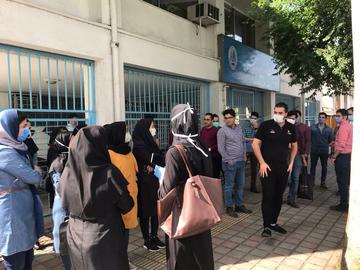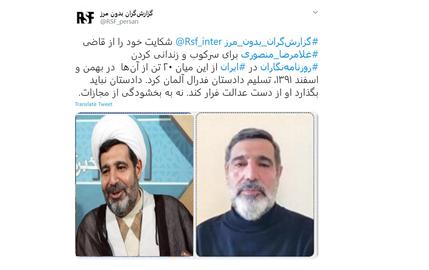Throughout the coronavirus outbreak, IranWire's Shahed Alavi has documented the trajectory of the crisis and how the government has handled it.
This is an update for IranWire's coronavirus chronology, covering early May.
Read the full chronology to date.
In early May, Iranian officials continued to contradict one another regarding steps the government was taking to combat the coronavirus epidemic. On May 5, health ministry spokesman Kianoush Jahanpour had claimed that Iran was self-sufficient in producing test kits and other medical items and the surplus would be exported or donated to other countries. On the same day, Mehr News Agency reported that 40, 000 test kits made by an Iranian company had been exported to Germany. But, on May 9, officials admitted that the World Health Organization was supplying kits to Iran, with Jahanpour acknowledging that it had donated 100,000 coronavirus test kits to Iran.
A Chinese company donated three scanner gates to the holy shrine of Imam Reza in Mashhad to be used to measure the body temperatures of the pilgrims, reported the Ministry of Foreign Affairs.
As officials issued warnings, Iranian Cyber Police arrested 320 people on May 9 and took action against 13,00 websites for spreading falsehoods and rumors about the coronavirus epidemic, which Hossein Ashtari, the commander of the national police said was “troubling the public mind.” He refrained from providing further information about the fate of the detainees.
While health officials discussed testing and authorities tried to control what the public shared online, Iran’s Supreme Leader had more overarching messages to impart. The West has failed to confront coronavirus, Ayatollah Khamenei announced in a video conference with members of the National Coronavirus Taskforce on May 10. “This failure manifested itself in three areas: managerial capability, social philosophy and morality,” he said. “The large number of people infected, the high number of deaths in the US and in certain European countries, and the problems the people are experiencing in those countries – including unemployment – prove their inability to deal with this problem.” In contrast, Khamenei boldly praised the Islamic Republic for its success and said “a truly impressive and praiseworthy feat was accomplished in the areas of treatment, various healthcare services, prevention, screening, and the disinfection of public places.”
800,000 Asked for Unemployment Insurance Payments but did not Receive it
Sanctions, the coronavirus epidemic, the drop in oil prices and global economic recession have presented Iran with a difficult and dangerous situation, officials said in early May. However, they insisted, excluding national mineral resources, the government has liquid assets worth 7,000 trillion tomans, or $470 billion.
If the government announcement about assets was designed to be reassuring, it wasn't having an impact on the lives of ordinary Iranians. Since the coronavirus epidemic started, 800,000 people have applied for unemployment insurance payments, but not even one of them has received anything, according to Mohammad Reza Pour-Ebrahimi, a member of the parliament’s Economic Affairs Committee.
In fact, economic panic was heightened back in February, after the early stages of the outbreak of the coronavirus in Iran, when more than one million bank checks, worth around 1.77 billion tomans or $118 million, bounced or not honored. Compared to a month earlier, these figures show an increase of 44 percent in terms of the number of bounced checks and around a 52 percent increase in value.
By May 10, foreign airline flights over Iran, which numbered over 900 a day prior to the coronavirus outbreak, had fallen to around 200 a day and the income derived from this source significantly declined, according to Ahsan Alavi, the deputy chairman of the parliament’s Committee on Development.
Medical Professionals Contract the Virus
Dr. Ali Akbar Velayati, president of Tehran’s Masih Daneshvari Hospital and the senior adviser to the Supreme Leader in international affairs, reported on May 9 that 10 percent of the medical staff and workers of that hospital had been infected with coronavirus. Velayati, who had been infected with coronavirus himself, did not explain why sanitary precautions were ignored in the first meeting about coronavirus that took place in that hospital, over which he presided.
At the same time, a group of nurses in the northern province of Gilan, which had been hit hard by the epidemic, held a protest rally. They said that, unlike other nurses who had been treating coronavirus patients, they had been denied insurance and benefits.
As of May 9, approximately 420 Iranian medical staff, including doctors, nurses and hospital workers, had been infected with coronavirus, and close to 110 of them had died, reported Dr. Mohammad Reza Zafarghandi, president of Iran’s Medical Council.
Worry for the Provinces
Although health ministry spokesman Kianoush Jahanpour said the spread of the virus and the number of hospitalizations was on a "downward curve" in all provinces except one and figures suggested the epidemic had reached a relative equilibrium, Dr. Masoud Mardani, a specialist in contagious diseases and a member of the National Committee on Coronavirus, warned during the second week in May that the number of new cases of Covid-19 infections in some provinces, including Tehran, Khuzestan, Semnan, Mazandaran and Gilan, were increasing exponentially. The public must be made aware that the epidemic is not over, he said. This was reiterated by Deputy Health Minister Iraj Harirchi, who said it was likely that cases would rise in some provinces. If re-opening businesses in any city leads to the spread of the disease, more strict measures would be taken, he said.
Harirchi also said the National Coronavirus Taskforce was going to allow universities to reopen after the end of the holy month of Ramadan on May 23 as long as the decline in cases continued. Class attendance on May 23 and afterward was on a voluntary basis. According to Education Minister Mohsen Haji-Mirzaei, some schools would reopen earlier, starting on May 16, but, as with universities, students were not required to attend, and he urged them not to unless they had specific educational needs that could only be met in the classroom.
On May 9, Khuzestan governor Gholamreza Shariati confirmed again that infections were on the rise in the province, but denied reports that hospitals had no available beds, stating that out of 180 intensive care unit beds available, only 140 were in use at the time. He also said he was waiting to see if the province would be re-imposing restrictions, based on recommendations from Ahvaz University of Medical Sciences and the Coronavirus Taskforce.
Khuzestan’s Bureau of Prisons announced that some inmates in the province had tested positive for coronavirus and had been quarantined, but said there was no need to hospitalize them outside the prison. Considering the Iranian prison system’s hygiene record and its history of meeting the medical needs of inmates, the claim that there was “no need” could not be taken seriously.
Because of the spike in coronavirus infections in the port of Abadan in Khuzestan, by May 10, the city had been totally quarantined. Offices and banks were closed and further checkpoints were put in place to restrict travel, the Abadan governor Zeinolabedin Mousavi announced. Khuzestan’s provincial government said it was going to close all offices and banks in nine cities for six days and only supermarkets, bakeries, butchers and grocery stores would be allowed to remain open.
Despite Jahanpour’s claims that only Khuzestan was experiencing an “alarming” situation and that other provinces were “stable,” approximately 19,000 people suspected of having coronavirus were quarantined in the province of Zanjan and 10,000 tests returned more than a thousand positive results, even though more than 50 percent of these patients did not show any symptoms, according to Dr. Parviz Ghezelbash, president of Zanjan University of Medical Sciences.
Tehran Still Center for Contagion
Also on May 10, Ali Maher, head of planning for the Tehran Coronavirus Taskforce, warned that infections in the capital were growing and asked for working hours to be staggered so that people could avoid rush hours. Dr. Alireza Zali, director of the Tehran coronavirus Taskforce, said the capital continued to be a center of contagion and relaxing of sanitary and hygiene precautions could have serious consequences.
Health minister Saeed Namaki warned again that the fall season in Iran would be difficult because a further coronavirus outbreak was likely, which was expected to coincide with an outbreak of influenza.
During a meeting of the Tehran Coronavirus Taskforce, the health minister Saeed Namaki said it was wrong and stupid to believe that coronavirus had disappeared, and warned that if the virus mutated and posed new risks, the situation could be become very dangerous again.
Read the full chronology, Lies, Misinformation and Makeshift Graves: a Chronology of Coronavirus in Iran
visit the accountability section
In this section of Iran Wire, you can contact the officials and launch your campaign for various problems





























comments